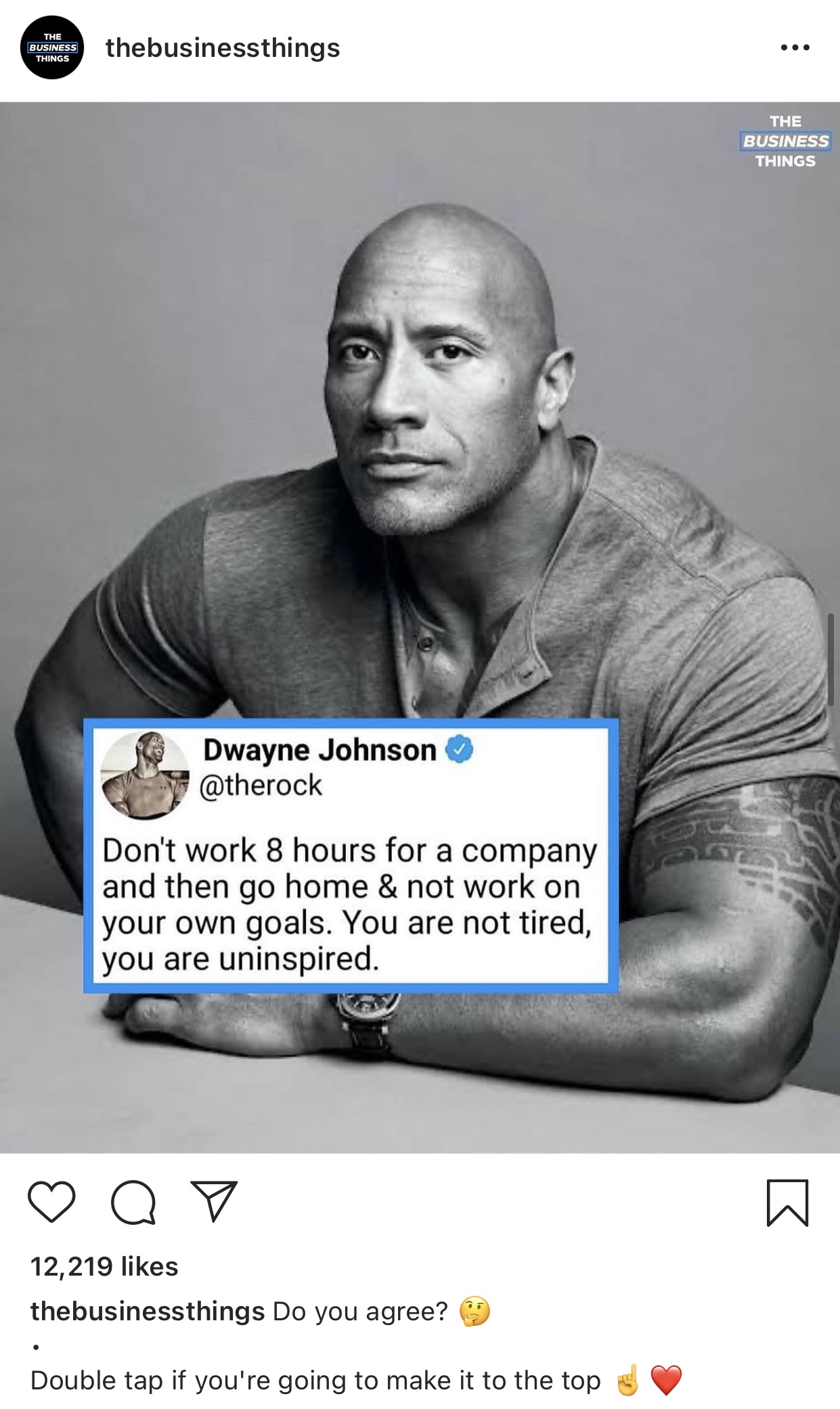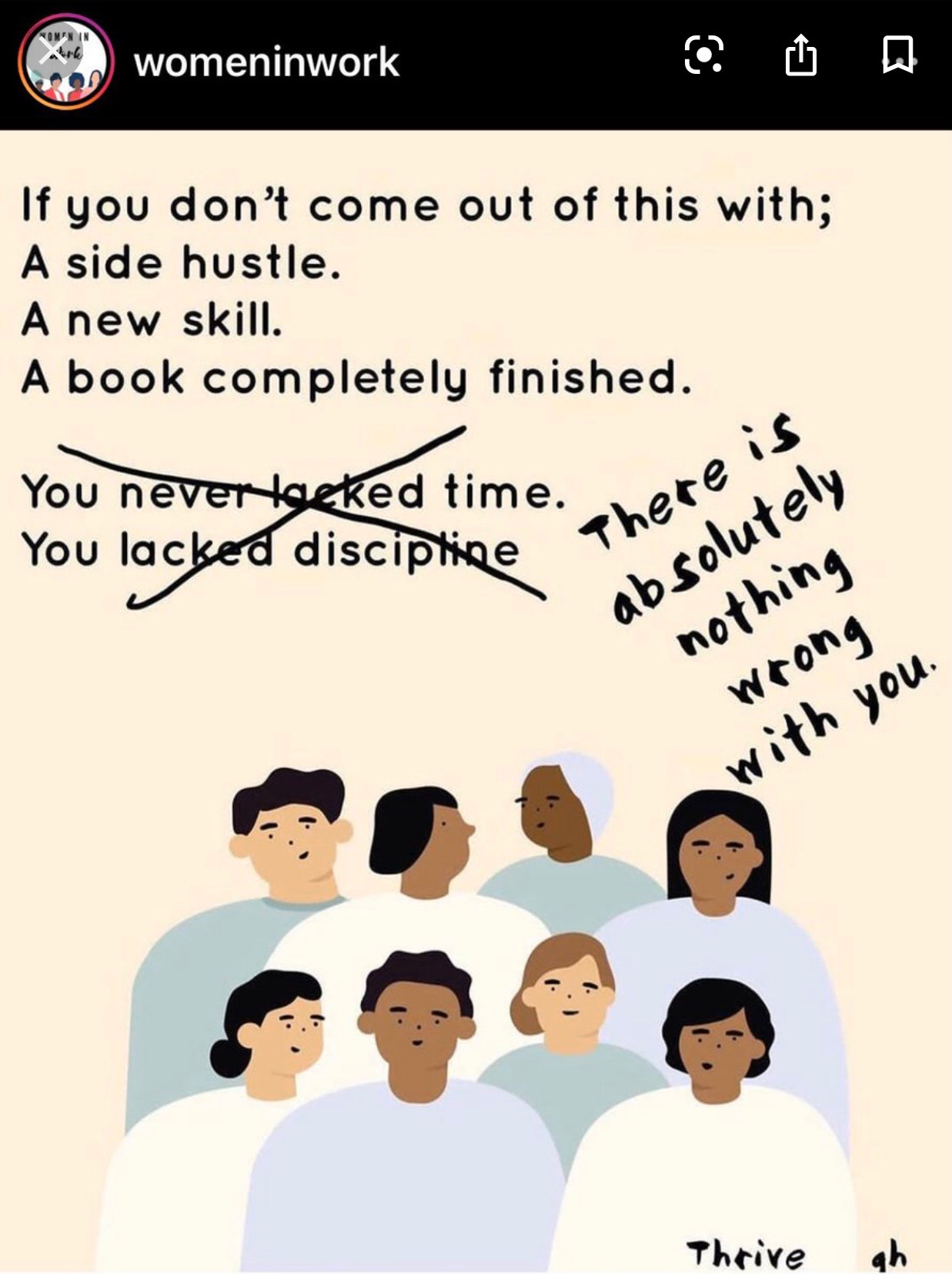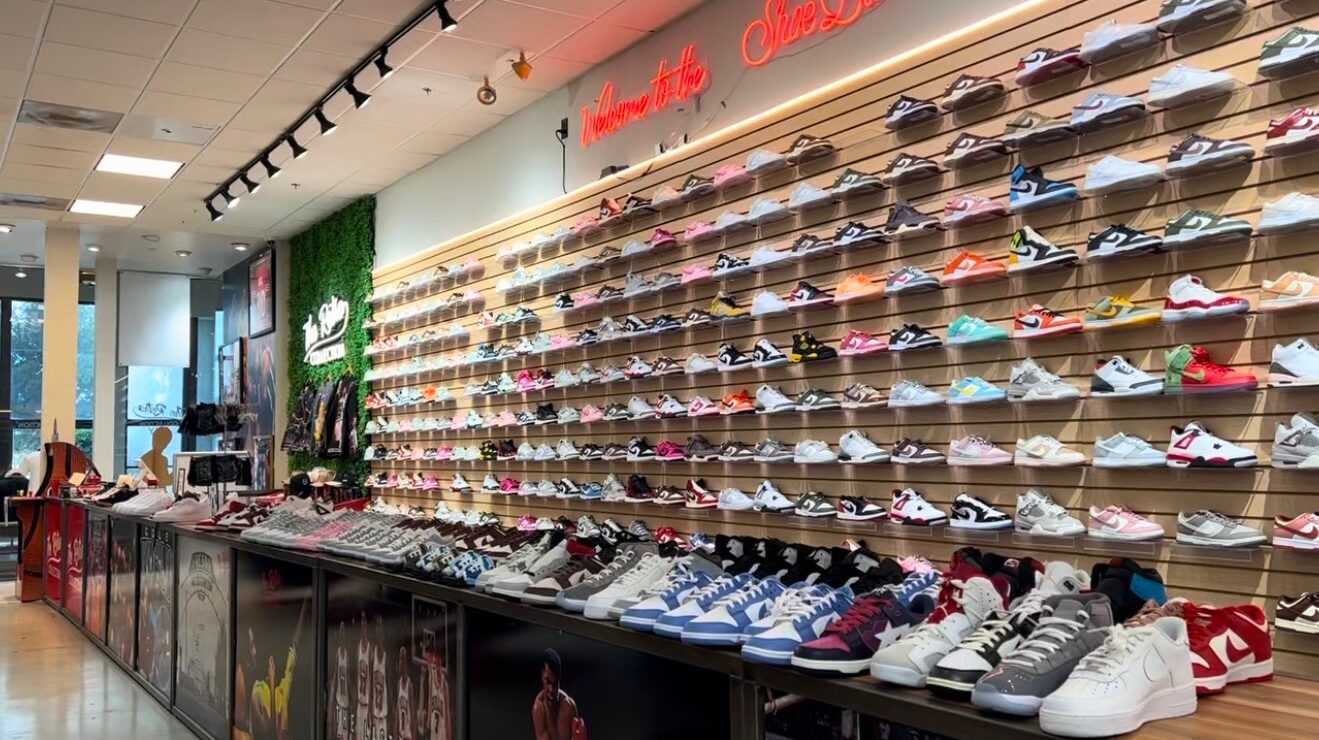Spoiler Alert: I’d argue for the former.

#NoExcuses and #RiseAndGrind are a portion of social media most commonly found on Twitter and Instagram. For context, #RiseAndGrind glorifies the endless hustle of work while often neglecting one’s investment in self-care or even self-compassion. Every day that you aren’t working towards starting your own business, your own practice, or doing anything to increase your earning potential, you are wasting your time. Meanwhile, #NoExcuses suggests that any disabilities or disadvantages that make your path to success more difficult than others is just an excuse rather than a valid reason to struggle.
This line of thinking far predates the 21st century but, as this dreadful year came to a close and everyone flocked to social media to collectively reflect on 2020’s events and to make their New Year’s resolutions, the issue was only exacerbated. Since most of the population has found themselves quarantined in their homes, many argue that this is the prime time to get your life together. To work on your “summer body,” to learn some new languages, to go extra hard on your schoolwork because what better way could you be spending your time while staying in the house all day, right?
This is not to say that people who happen to work well under pressure or have unwavering ambitions to thrive are at fault here. Rather, the problem comes in when people who display these characteristics expect the same out of everyone else and claim that anyone unable to keep up with them is a failure.
This “no excuses” mindset is a contemporary rendition of the bootstrap mentality that derives from the neoliberalist outlook on capitalism and economic competition: regardless of how this country refuses to help you with the problems it has caused or exacerbated for you, you still should still play the game. If you just pull yourself up by your bootstraps like any other [privileged] person in this society, perhaps you could make something of yourself.
The distinction between this mindset versus the spirit of motivation and encouragement mirrors the contrast between the concept of equality and equity. The first argues that everyone should be able to progress equally since, presumably, everyone has been given access to the same resources to thrive. Meanwhile, the other acknowledges the various inequalities that necessitate increased or personalized resources for different people to thrive.
In lieu of the very racist, classist routes of this bootstrap mentality and flawed sense of equality, I find it particularly alarming to see how many tenets of this ideology are Black people. I bring this up specifically because, as a systemically disenfranchised group, this is the same attitude that has been weaponized by white capitalists who have no interest in decolonizing American society.
Disregards of Social Inequality
The stigma against government assistance programs is perhaps most evident of how this ideology has been extremely pervasive and harmful throughout American history. Consider the stereotype of the Welfare Queen: a racist and classist portrayal of Black women who haphazardly birth a bunch of children in order to maintain the lavish lifestyle they live using government money. Rather than work to support themselves, they choose to live off of the taxpayer’s hard-earned money.
 This imagery was popular during the 70s to mobilize public disapproval of these anti-poverty initiatives and, aside from grossly exaggerating the quality of life government assistance has been able to provide to those who require it, this stereotype is guilty of a number of things: 1) It contributes to society’s lack of empathy towards impoverished people who require government assistance in order to support themselves and their families. This has been evident even currently with how various Twitter users have responded to the less than sufficient stimulus checks the government has been dispersing during this pandemic. It’s true that some assistance is better than none at all. But reiterating this fact or bullying people for not having high-paying jobs to support themselves without it, rather than allowing the space to critique the government for not doing everything they can to provide sufficient aid to its citizens in-need, is counterproductive. Especially since 2) this attitude ultimately assigns blame to poor people who require assistance rather than assigning it to the corporations who don’t provide living wages or worker’s benefits to their employees.
This imagery was popular during the 70s to mobilize public disapproval of these anti-poverty initiatives and, aside from grossly exaggerating the quality of life government assistance has been able to provide to those who require it, this stereotype is guilty of a number of things: 1) It contributes to society’s lack of empathy towards impoverished people who require government assistance in order to support themselves and their families. This has been evident even currently with how various Twitter users have responded to the less than sufficient stimulus checks the government has been dispersing during this pandemic. It’s true that some assistance is better than none at all. But reiterating this fact or bullying people for not having high-paying jobs to support themselves without it, rather than allowing the space to critique the government for not doing everything they can to provide sufficient aid to its citizens in-need, is counterproductive. Especially since 2) this attitude ultimately assigns blame to poor people who require assistance rather than assigning it to the corporations who don’t provide living wages or worker’s benefits to their employees.
In lieu of this pandemic’s events, it’s understandable that a lot of smaller businesses would struggle to support their workers during this time because they often struggle to maintain their economic sovereignty even under normal circumstances. But for the billion-dollar corporations whose employees face the same level of financial insecurity, if not worse, it’s absolutely ridiculous.
These CEO’s have their manufacturing and shipping employees to thank for pretty much all of their success as businessmen since their product output and quality is entirely contingent upon these people. But despite that, most of these workers are not even paid a living wage and, to add insult to injury, they are then criticized for “settling” for a low-paying position in the first place, and no judgment is passed on their employers, the people who created the low-paying positions in the first place.
False Idols in the Black Community
And what happens when you begin to blame a victim for their own misfortune?
You begin to empathize with their assailant.
We see the enforcement of these capitalist ideals in the Black community begin to demean impoverished populations since they are viewed as the “losers” of society. This results in the appraisal of Black celebrities and public figures who are viewed as “winners” since their wealth signifies that they’ve “played the game” pretty well so far. This is pretty understandable since the encasement of their success in Black skin means there’s at least a possibility for us to make it even with all the barriers in place. Meanwhile, their diversifying presence in their respective disciplines suggests that there’s hope these figures will take strides towards creating opportunities for even more Black people to populate that discipline. This would be all well and good if many of them weren’t just as conniving, selfish, and anti-Black as many of the white capitalists we compare them to.
Consider some of their responses to 2020’s spirit of racial reckoning, for instance. With the various protests, riots, and public outrage elicited by the police killings of George Floyd and Breonna Taylor, the pressure was high for celebrities and public figures to speak out in support of the Black Lives Matter movement. This pressure was applied tenfold to Black celebrities since most of them can attribute their success to their large Black following.
Many people viewed this as an opportunity for them to give back to the community they’ve so happily profited off of. Needless to say, the following celebrities missed the mark. The rapper, Lil Wayne, and Nickelodeon actor, Shameik Moore, were blasted for expressing the sentiment that the police, as a whole, are not to blame for the brutality and murder of Black people. Arguing that people should take more responsibility for their own murders. While Shameik Moore later apologized for the timing (not the nature) of his commentary after it was “taken out of context,” Wayne’s argument devolved in a similar fashion by suggesting our public outrage is misplaced due to “a bunch of facts that we think we know that we don’t know.”
If the aforementioned facts include the breach of police protocol used to restrain George Floyd by his neck or the exposed lies, confusion, and corruption of Breonna Taylor’s team of murderers, I’d say that public outrage is more than warranted.
Meanwhile, T.I., Killer Mike, and Mayor Keisha Lance Bottoms were under fire for T.I. ‘s condemnation of the riots and lootings going on in Atlanta. He’s on record saying, “We can’t do this here. This is Wakanda. It must be protected.”
Atlanta is often viewed as a beacon of Black popular culture since it serves as a filming site for a number of Black movies & TV shows. It also hosts a large Black population in general, which contributes to its large number of Black business owners. This Black prominence in the media, economy, and population is what led to T.I.’s comparison (even if misplaced) to the Black utopia of Wakanda.
But his attempt to disguise his materialistic agenda with pro-blackness and a false sense of kumbaya backfired on him because it revealed that he was more concerned with Black-owned things than he is with Black people, which is as anti-Black as it gets. Rather than make productive use of his platform and resources by supporting Black protestors who were wrongfully arrested or donating to the families of George Floyd, Ahmaud Arbery, Breonna Taylor, or someone else whose case wasn’t as popular as the Wakandan leader he views himself as, he was too busy running his mouth and parroting the same materialistic jargon that we had already heard from many of his white counterparts.
 By looking at this recent display of foolery on the part of Black capitalists like these, we can see how the hustle mentality, even in its more successful form, just sets people up to value profits and assets more than they do human life. Even in a community that is dominated by Black capitalists rather than white ones, everyday Black people still struggle to gain empathy or support in the issues that plague us as a community. Their wealth does not make them worthy of our admiration or jealousy because allowing your life to be dictated by the endless hustle to gain money and power leaves no room for compassion. Not for others and not for yourself.
By looking at this recent display of foolery on the part of Black capitalists like these, we can see how the hustle mentality, even in its more successful form, just sets people up to value profits and assets more than they do human life. Even in a community that is dominated by Black capitalists rather than white ones, everyday Black people still struggle to gain empathy or support in the issues that plague us as a community. Their wealth does not make them worthy of our admiration or jealousy because allowing your life to be dictated by the endless hustle to gain money and power leaves no room for compassion. Not for others and not for yourself.
Editor’s Note:
Last year had been awful to everyone except the ultra-rich. People have lost their jobs or a significant amount of their pay, their homes, their sobriety and/or their loved ones to the strenuous circumstances of 2020. Some have struggled while being in isolation and navigating online academic spaces while others have struggled while being overworked and underpaid at their essential jobs. So if by the end of 2020, you didn’t finish your degree, lose weight, or become fluent in 3 new languages, that is OK. We have been in a pandemic for over 9 months now and there is no end in sight. Maintaining the will to live and take care of yourself will always be an amazing accomplishment, even if that is the only thing you did last year. I am proud of you and wish you a Happy New Year.


